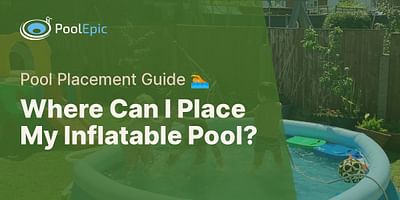Derek Fisher is a fitness trainer who advocates for aquatic exercises as a fun and effective way to stay in shape. He often uses inflatable pools for his training sessions, and he has a wealth of knowledge about the best pool options for different fitness levels. Derek's articles are a great resource for anyone looking to add a splash of fitness to their pool time.
Absolutely! While it may seem unconventional, installing an outdoor above ground pool in your basement is indeed possible. In fact, it can be a fantastic way to transform your basement into a private oasis and enjoy the benefits of a swimming pool all year round. However, there are a few important factors to consider before diving into this project.
1. Size and Space: The first thing to assess is whether your basement has enough space to accommodate an above ground pool. Measure the dimensions of your basement and compare them to the size of the pool you have in mind. Keep in mind that you'll need to leave enough room for a deck or walkway around the pool for easy access.
2. Structural Integrity: Before proceeding, it's crucial to consult with a professional contractor or engineer to evaluate the structural integrity of your basement. They will assess whether the floor can support the weight of the pool, water, and additional equipment. Reinforcements may be necessary to ensure safety and prevent any structural damage.
3. Waterproofing: Basements are prone to moisture, so it's vital to address any existing water issues before installing an above ground pool. Waterproofing the basement walls and floor is essential to prevent leaks and water damage. Consult with a waterproofing specialist to ensure your basement is properly sealed.
4. Ventilation and Humidity: Pools generate humidity, so proper ventilation is crucial to prevent excess moisture buildup in your basement. Consider installing dehumidifiers or exhaust fans to maintain a comfortable and healthy environment. Adequate ventilation will also help prevent mold and mildew growth.
5. Access and Entry: Consider how you will access your basement pool. Will you need to modify existing stairways or create a separate entrance? Ensure there is a safe and convenient way to enter and exit the pool area.
6. Safety Measures: Safety should always be a top priority, especially when it comes to pools. Install proper fencing, gates, and pool covers to prevent accidents and ensure the well-being of everyone in your home. Additionally, consider adding non-slip flooring around the pool area to minimize the risk of slips and falls.
7. Maintenance and Upkeep: Owning a pool requires regular maintenance to keep the water clean and safe. Consider the additional time and effort required for maintenance, including water treatment, cleaning, and equipment upkeep. It's important to have a plan in place to ensure the pool remains in optimal condition.
Conclusion: Installing an outdoor above ground pool in your basement can be a unique and exciting project. However, it's crucial to carefully assess the space, consult with professionals, and address any necessary modifications to ensure safety and functionality. With proper planning and execution, you can create a stunning indoor pool area that allows you to enjoy swimming year-round. For more information and tips on setting up an indoor inflatable pool, feel free to explore our website, Pool Epic. Happy swimming!













